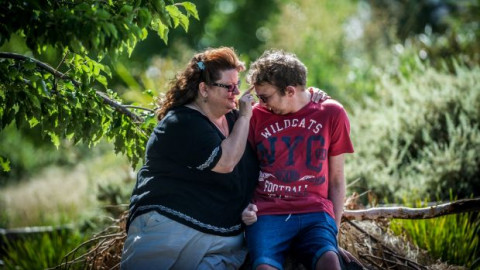
Sherryn Groch
As new research reveals Australians with intellectual disabilities are dying avoidable deaths, two Canberra carers share their own 'horror' stories.
It started with just a runny nose and a routine trip to the doctor. Then Gungahlin mother Therese Bean noticed her son was losing weight.
Nicholas, 23, who has non-verbal autism, began spending all day lying on the couch and struggled to keep food down. A lump the "size of a 50 cent coin" appeared under his chin. Eventually, it became difficult for him to breathe.
But, despite numerous visits to multiple doctors as Nick's condition worsened, Ms Bean said it took six months to convince medical staff to perform a simple blood test.
"Eventually, I'd just had enough," she said. "He kept getting sicker and they kept fobbing it off as a cold so I virtually demanded a blood test and an X-ray and then they rang me first thing the next morning...it was leukemia.
"The [oncologist] said 'if you don't start treatment, he's got about three weeks left'."
While Nick is now in recovery following a stem cell transplant last year, Ms Bean said she was furious with the way he had been treated. By the time he was diagnosed in 2015, a mass in his chest had grown to 17cm.
"He couldn't even lie down during the MRI, it was so big. It could've been very dire if we weren't as persistent as we were," she said.
"You trust the doctor to know what they're doing but you know as a parent when something's wrong with your child."
A new report released on Wednesday suggests the Bean family's story is far from an isolated case. Research published in the BMJ Open found Australians with an intellectual disability are twice as likely to die an avoidable death compared with the general population.
In 2009, a NSW woman with a mild intellectual disability, Michelle McIlquham, died of meningitis after being kicked out of hospital at 4am. The coroner later found her acute pain had been passed off as a "temper tantrum".
Belconnen woman Marie said she was deeply affected after reading Michelle's story. Her nine-year-old son has autism and almost contracted bacterial meningitis last year when his relatively rare condition of bacterial sinusitis went undiagnosed for several months.
"I just thought, it could have been my boy. We could have lost him," Marie said.
"He was holding his head all the time, he was in so much pain. I think [the doctors] just assumed he was pretending to get out of school, but he loves school."
After being turned away from hospitals and doctors' offices, Marie said she eventually "forced" her GP to order an MRI scan.
"They kept saying it was behavioural but finally I got a letter from the hospital recommending an MRI referral and my GP still said no, then I said 'I'll pay for it'.
"You should have seen the look on his face when we got the results back. My little one needed surgery in the end and the specialist said to me 'you'd be surprised how often this happens to people with disability'."

Nick Bean in hospital after a stem cell transplant. Photo: Supplied.
The ACT Disability, Aged and Carer Advocacy Service, which is funded by the government, said people with an intellectual disability are often denied the right to be included in their treatment decisions.
According to chief executive Fiona May, this was the case for a local man who was cut off from rehabilitation after surgery because he was considered unable to "make and understand rehab goals".
"This needs to change," she said.
With the support of the advocacy group, who also provided education to hospital staff, Ms May said the man was eventually able to complete his rehab.
An ACT Health spokeswoman said paediatric trainees spent six months involved in the diagnosis and management of children with a variety of developmental and behavioural problems and chronic conditions, including autism.
"ACT Health provides accessible and inclusive health services for all people in the ACT according to clinical need, including people with a disability," she said.
ACT Health has run a specialist mental health service for people with an intellectual disability since 2002.
But, both Marie and Ms Bean said medical professionals needed to learn to listen more to carers when treating a patient with a disability or autism.
"My other boy has an intellectual disability too and the hospital triage people always put us as a low priority, every time," Marie said. "I feel sometimes they're doing it just because they've got a disability."
While Marie is supported by a government Aboriginal liaison officer, she said there needed to be similar support for patients with a disability.
"A disability action plan and guidelines are fine but I don't think it goes far enough, I think they need to be accountable."
Despite complaining about the incident last year, Marie said she never heard back from hospital management.
"I know a few parents of kids with disabilities that record their hospital visits now because they don't trust them. There's no recourse if we complain, its us against the doctors."
Nick Bean faced similar problems in emergency when he was seven years old and suffering from appendicitis. Despite severe stomach pain and vomiting, he was sent home from hospital.
"They didn't know what to do with him or how to treat him," Ms Bean said. "We needed exploratory surgery just to find out what was going on, so he's now got a big scar."
While she said the oncology team at Canberra Hospital had been very accommodating of Nick's condition, she warned parents and carers to "trust their gut" when their child was ill.
"Keep at them until you get an answer. We've had to do that a lot for Nick...He can't communicate for himself but he knows what's going on."
from http://www.canberratimes.com.au/act-new…
see also